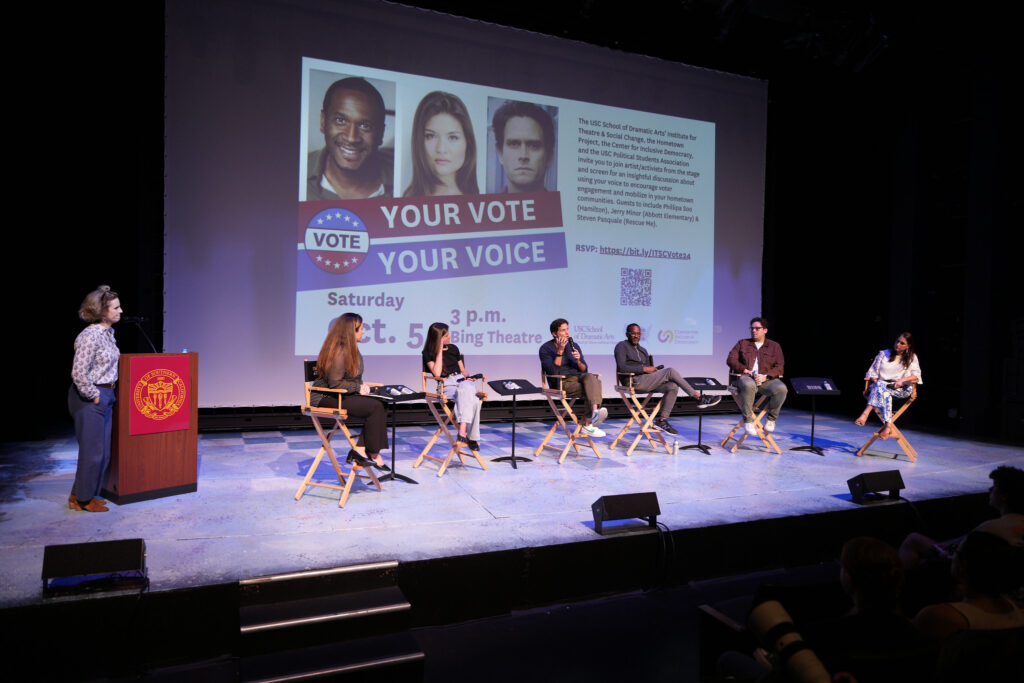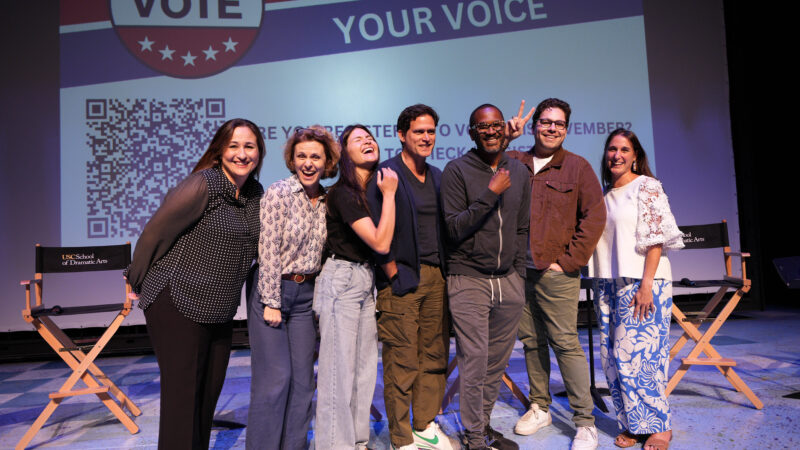In early October, students from across the university gathered in the Bing Theatre to hear from a panel of artists and activists help demystify the voting process, and understand the importance of voting not only in national elections but also state and local elections, as well.
Why was a panel about democracy hosted in the USC School of Dramatic Arts’ theatre? SDA Professor Laura Flanagan explained.
“One of the bedrocks of what we teach at this School is that all stories are dependent on someone doing something. Taking action is part of what we teach, what we model, and what we believe,” she said. “We’re telling stories on this stage and on film, but we’re also living them. We share this one story: the story of the United States of America. We’re all part of making that story.”
“There is so much power in storytelling. We need storytellers and we need creatives,” added Kevin Rutkowski, a strategic consultant and SDA alumnus (BA Theatre & BA Political Science ‘13). “They’re the ones who are designing and creating and thinking of a world that we just don’t know is possible right now.”
Moderated by Mindy Romero from the Center for Inclusive Democracy at the USC Sol Price School of Public Policy, the non-partisan event featured a conversation between actors Phillipa Soo (Hamilton), Steven Pasquale (Rescue Me) and Jerry Minor (Abbott Elementary), along with Rutkowski and Erin Frederick, Founding Executive Director of the Hometown Project.
Soo, who originated the role of Eliza Hamilton in Hamilton, discussed how her career in theatre helped naturally inspire involvement in politics.
“[After moving to New York,] my world got suddenly bigger,” she explained. “I just started thinking about how other people live their lives. I think a large part of that is that I went to a theatre program, where my job was to learn how to empathize with people.”
Pasquale, who has also starred in Broadway shows such as American Son and The Bridges of Madison County, shared a similar story. Having grown up in a small town, he began having conversations with people that challenged his beliefs and expanded his worldview when he became college-aged.
“When I became an actor and a theatre-maker and an artist, I found myself having conversations with tons of people who challenged my belief system and really affected the way that I feel about the world,” he said. “For me, it was right at that college age of 18, 19, 20, that I had conversations with people who grew up different from me, who look different from me or live different from me, that opened my mind to the idea of changing my ideology that I had been indoctrinated into as a young person.”

Minor emphasized that participation in democracy didn’t need to be stressful, and could entail great joy, especially when enacting small but important changes at the local level.
“What got me into being politically active was local things,” he explained. “I think we tend to dismiss local elections, but as far as I’m concerned, I think that those things affect your quality of life more than our bigger elections.”
Each of the panelists discussed their involvement with the Hometown Project, an organization founded by Frederick that encourages people in the arts and entertainment industries to engage with voters, friends and acquaintances in the towns where they grew up.
Each panelist emphasized that small social nudges from trusted friends and family members could yield powerful results.
“When I was your age, I missed a couple of elections. I’ll tell you why: I was doing other stuff. I was busy. You are busy. You’re trying to get your lives together,” said Minor. “What helped me when I was younger was social pressure. Like: ‘You’re not voting?’ Go ahead and have that conversation.”
The panel was followed by an open Q&A with students, who asked about overcoming obstacles to voting, tips for avoiding political burnout, and advice about researching policy details. The panelists discussed the phenomenon of low voter turnout among young people, and encouraged students to not be discouraged or disheartened by it.
“If you feel disconnected from the political process; if you wonder about the lesser of two evils; it’s a political system that excludes young people. Historically—18-year-olds didn’t get the right to vote until after the Vietnam War,” explained Romero. “I want you to walk away not being down on yourselves.”
Pasquale made sure the audience understood the importance of their job as storytellers.
“History is told by our leaders, and our warriors, and our storytellers—that’s it,” he said. “There’s no more important job than being a storyteller.”
